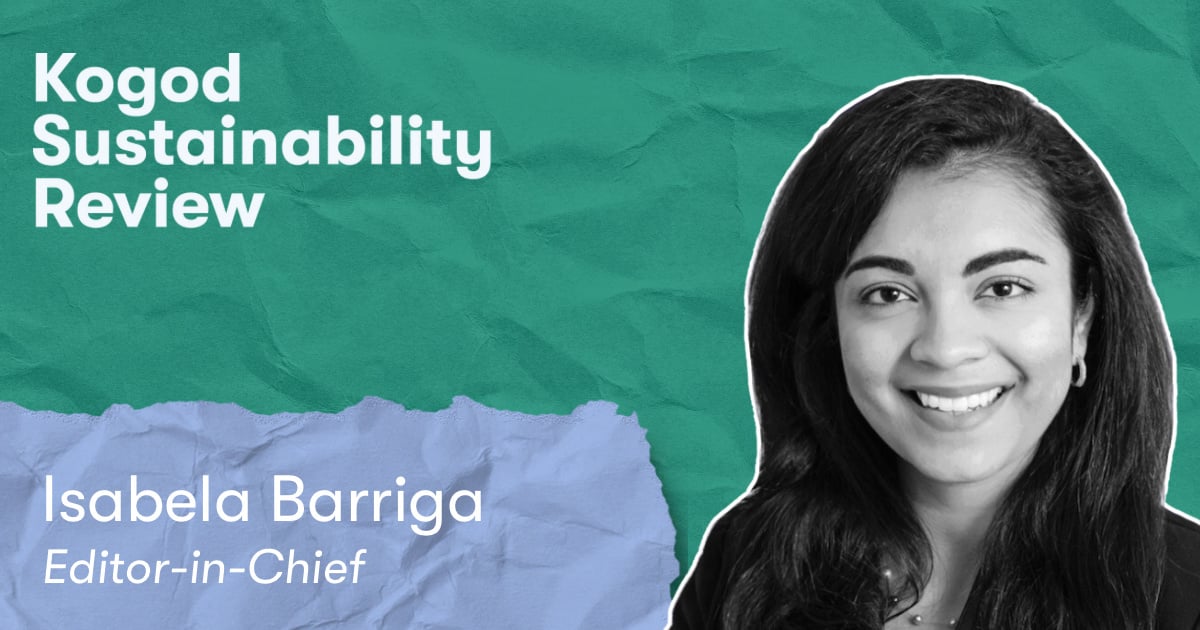
Isabela Barriga
MS in Sustainability Management Student, Kogod School of Business
Dear KSR Community,
As Editor in Chief of the Kogod Sustainability Review (KSR), I’m thrilled to introduce this edition’s theme: “Circular Economy: Innovations for Sustainable Development.” The inspiration for this theme is drawn from nature, a reminder that nothing exists in isolation. Just as trees stand tall in forests, their roots forming unseen mycorrhizal networks that share vital resources and sustain one another, our economy, too, must be reciprocal. The cycles of life, the ebb and flow of tides, and the phases of the moon—reveal the strength in interconnectedness and the power of renewal. Growth is communal, regeneration is possible through shared resilience, and when we tune into the natural cycles we are inherently a part of.
This issue highlights invaluable contributions from our guest writers, whose expertise and perspectives set the tone for this edition. Garima Sharma from American University (AU) offers a thoughtful exploration of how systems thinking can enable organizations to implement circular economy models. Stefanie Onder from AU and Luis Diego Herra Garcia of the World Bank share groundbreaking insights on measuring comprehensive wealth and metrics like The Changing Wealth of Nations, which can help policymakers assess the sustainability of economic progress. Melanie Rua from Bloomberg unpacks the evolving role of waste in corporate strategy and how to transform waste from a liability into an opportunity. Lee Steinke from CisLunar Industries takes us beyond Earth’s atmosphere to uncover how circular economy principles are being applied in space. Finally, Julia Marsh from Sway shares the power of seaweed and how bioplastics and regenerative design can reimagine waste into a valuable resource.
These guest contributors offer vital perspectives that are complemented by the voices of our graduate student writers, from American University and beyond, who dive deep into other key areas of the circular economy transformation such as sustainable supply chains, circular economy solutions for disaster relief, and financing mechanisms, in addition to other tools essential for driving change.
This issue also makes a call for gender equity and justice in circularity. We recognize that impactful change requires participation from all voices. This edition amplifies Indigenous perspectives and traditional ecological wisdom which guide us to respect the interconnected nature of life and reflect on how we engage with the Earth. By returning to these principles, we can reimagine our systems and create regenerative models for the future that support the health, equity, and prosperity of all beings.
Just as trees rely on their underground mycorrhizal networks to connect and nourish each other, we can also find strength in connection.

Isabela Barriga
MS in Sustainability Management Student, Kogod School of Business
At KSR, we aim to foster thoughtful dialogue and reflection, and we invite you to see yourselves as part of this vast system. On behalf of the entire KSR team, please join us in advancing the circular economy, and let this edition be a reminder that we are all part of something larger—a living, breathing network of life’s cycles—where transformation begins when we remember our place within it.
Warmly,
Isabela Barriga
Editor in Chief, Kogod Sustainability Review
